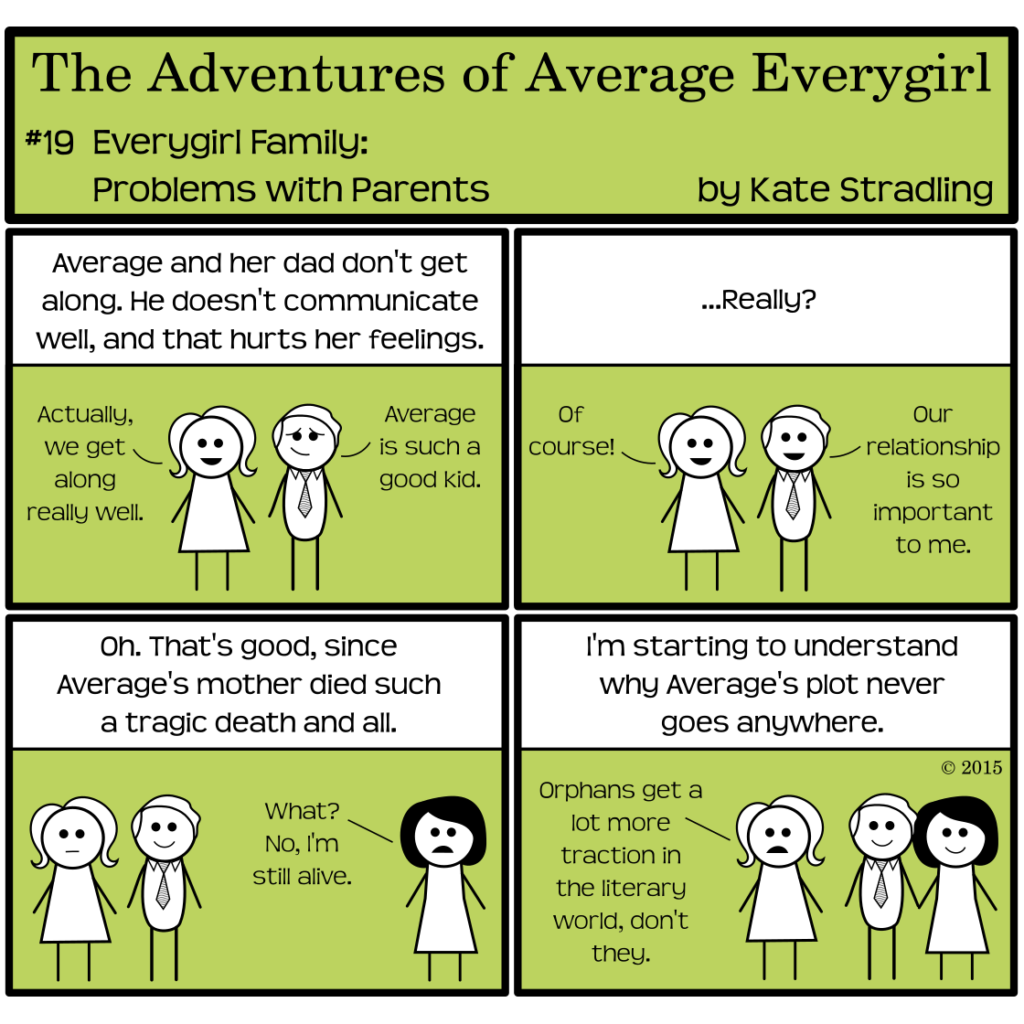
I am so guilty of the “dead mother” trope. So guilty. When you’re writing fantasy, it’s almost like a default condition for the main character, to the point where I’ve had to stop myself and say, “No, really, why would his/her mother be dead?”
I could postulate a number of theories on the prevalence of this trope. Sometimes it’s simply because the story wouldn’t take place otherwise. It says a lot about the stability a mother brings into her children’s lives, that her absence creates conditions for danger, adventure, and difficulty. Often, the death of a mother becomes one of the driving forces for the main character’s actions. If her death was sacrificial, even more so.
It’s an easy plot mechanism, in other words.
Decisions behind the scenes
Sometimes, a character has no mother because that’s one less character to muddy up the narrative. If a plot doesn’t call for a mother, the mother gets left out. The author doesn’t have to specify what happened to her; the reader can deduce that she died (or more generically, that she’s not in the picture) and move on.
Writing often involves keeping character lists trim and efficient. Readers only have so much of an attention span, and extra characters who have no great bearing on the plot can become a distraction or, worse, an annoyance. When making cuts of this sort, family members often don’t survive.
Convenient plot devices and efficient casting are superficial excuses, though. In my view, the “dead mother” trope has another likely source: it’s a narrative drawn from the unfortunate realities of life.
A mother or the lack thereof
Although modern science and medicine have drastically reduced maternal mortality rates, only a hundred years ago a woman would take her life into her hands to deliver a child into this world. Women had more children back then, and the risk didn’t change with each successive birth, which meant that, for the greater part of recorded history, a multitude of mothers died during or immediately after childbirth.
And their children grew up motherless. (If they survived, that is. Infant mortality above-and-beyond overshadowed maternal mortality.) Having no mother wasn’t an anomaly. It was a relatively common occurrence. The narrative appears in fairy tales and folklore. Motherless characters abound in classic works and history alike. If childbirth wasn’t the culprit, a dozen other potential executioners waited in the wings.
A mere century of good hygiene and medical practice isn’t enough to eradicate a narrative that’s existed for thousands of years, a narrative that yet exists in many developing nations. Maternal mortality rates continue to drop worldwide (thankfully), but the effects of bygone years don’t vanish.
In that respect, it makes sense for writers who look to the past for inspiration to include what was once a very real possibility.
Still, it’s not a trope to take lightly. I can’t imagine my life without my mother. She knows me better than anyone else, she loves me more than anyone else (probably, haha), and she keeps me emotionally grounded. When I think about my relationship with her, I realize what a crummy thing it is to deprive a character of that same relationship.
But, granted, not all mothers are as amazing as mine.
The antagonistic parent is a trope for another day, however.
Thanks for the kind words, but I think your being “emotionally grounded” comes from a higher source. And I could debate you all day on who keeps who grounded. You don’t give yourself enough credit. You are pretty amazing all on your own. And besides, I like your orphan characters.
Yes, God keeps me emotionally grounded, but He works a lot of that through you. 😉
Glad you like my orphan characters. I’m taking that as permission to write more of them.
Writing more is good!
Agreed. I’ll work on it.
*giggle* I’m glad I’m not the only author whose mum comes along to cheer! It’s nice to see 🙂 My mother cheers for me on Twitter/FB though not so much on blog.
I’m not remotely grounded, though; and while mum is quite often ‘grounded’ that’s cos she’s fallen over due to meniere’s disease 😀
Cheerleader mothers are one of life’s great delights. I’m so grateful for mine (as I’m sure you are for yours). 😀
No fun on the Meniere’s, though. :\
Comments are closed.